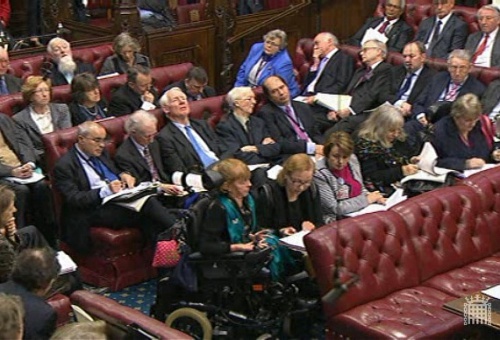How do you decide who to vote for? We are all influenced by a range of factors: parties whose record we approve of, individuals we like and trust, adherence to policies which are important to us. Sometimes, we have to prioritise, and this is a time when there is great potential for both exciting growth and development in end of life care, but also for acceptance of a counsel of despair by permitting assisted suicide and euthanasia. Will you make end of life care a priority when you go to the polls this May?
This is far from a narrow issue concerning a limited number of people. How we approach death and dying is a matter for each and every one of us, especially in difficult economic times. Here's how you can make sure those seeking your vote recognise this:
Identifying PPCs
- Although many Prospective Parliamentary Candidates (PPCs) are selected months or years in advance of an election to allow them to build their profile, nominations do not formally close until less than three weeks before the election, and so there are not currently formal lists of candidates.
- Most of the 'larger' parties have published, and continue to update, lists of candidates already adopted (or else details for local parties). These include the Conservatives, the Greens, Labour, the Liberal Democrats, Plaid Cymru and UKIP. Please note that these particular parties are listed here purely because they have made such information readily available, and we encourage you to 'cast the net wide'. Other sources (e.g. BBC, Your Next MP and UK Polling Report) have attempted to collate available information, with wheredotheystand.org.uk twinning such details with candidates' known history on assisted suicide (and several other more broadly 'pro-life' topics).
- Candidates in marginal constituencies may prove particularly attentive to voters particular concerns - do you live in one?
- You can find key information on the election at the Electoral Commission's 'About My Vote' website. This includes a mechanism to identify which local authority is responsible for the election of your MP; their returning officer is the best person from whom to seek further assistance in contacting other candidates or local parties. If you're not sure what your constituency is, visit Parliament's website.
Paths
- Contact PPCs in writing or in person and ask them about these issues.
- Use local (e.g. newspapers, radio phone-ins) or social (e.g. Twitter, Facebook) media to seek answers from PPCs in public view.
- Ask local media outlets (newspapers, regional TV, radio etc) to have candidates lay out their opinions and approaches side by side.
- Question candidates at hustings events.
Tips
- Always be polite and always remember that politicians are people like you, who like you will have experienced both the bright and the bleak in life. In this debate, it is healthy - concerning motivation - to give the benefit of the doubt at least in the first instance.
- Always try to get clear and specific answers on views and intentions, so ask clear questions. PPCs may be able to tell you that they would never vote for assisted suicide, but many others will - understandably - feel unable to comment on a bill that doesn't exist. You could then instead ask them how they would vote on the very real bill introduced by Lord Falconer - a summary of which you could supply ahead of your meeting. Similarly, no PPC will tell you that they do not support palliative care, but how many know about the level of support available to terminally ill patients or seriously disabled people, and their families, in your area? How many have considered how to improve access to such services? How many will champion good care which values patients as people, and understands their needs?
Policy Context
- Parliamentarians in both Westminster and Holyrood are considering bills to allow for assisted suicide. This is a live issue for politicians across the UK and those elected to the 2015-20 Parliament may well have to vote on whether your family doctor can prescribe lethal drugs to your neighbours or even family members. Key political leaders oppose such moves, but what do your would-be MPs think?
- Campaigners have sought to go further in the courts, with the most senior judges in the country having been petitioned to allow euthanasia for disabled people. Not only is there a strong prospect of such challenges being repeated, but the Director of Public Prosecutions has amended her prosecution guidelines concerning the involvement of healthcare professionals in instances of assisted suicide, in the light of the Supreme Court ruling.
- There are many terminal illnesses, in addition to cancer, and many do not receive anywhere near sufficient attention. An Alzheimer's Society/Marie Curie report recently highlighted that 'dementia patients are not getting the care they need because the condition is not recognised as a terminal illness'. Hundreds of thousands in the UK have dementia: how are they represented in these debates, and how would your PPCs work for them?
- The spectrum of those pressing for assisted suicide and euthanasia is broad, stretching right down to those who say that the suicides of depressed teenagers are acceptable collateral damage and those of elderly people are rational. How would your PPCs approach provision for elderly people - who often accumulate various illnesses with a 'terminal' quality - and how will they tackle weaknesses and failings in elderly care, detailed in report after report, after report after report? You can't expect them to have a 'silver bullet' for such issues, but what would they do about instances of abuse in care homes, or reports of age-based assessment for cancer treatment?
- More than anything else, we want to work towards ever-improving, ever-more widely embracing end of life care, with the fantastic work of palliative care teams and hospices at the centre, and we know you do too. But how do your PPCs respond to, for example, the news that half of hospices in England had their NHS statutory funding either cut or frozen in 2014? Again, we cannot expect silver bullets from candidates - certainly not on every issue - but have they given this considered thought? What concrete steps are they taking to be part of a solution?
Some suggested questions for PPCs
- Do you support Lord Falconer's Assisted Dying Bill?
- Do you support Patrick Harvie's Assisted Suicide (Scotland) Bill?
- How would you support making better palliative care more widely available and accessible in your constituency?
- How would you support making better palliative care more widely available and accessible nationally?
We know the importance of these issues: now it's time that your PPCs did. Make your voice heard today (and do let us know of any significant responses).
© Image copyright of Simon Clayson and licensed for reuse under Creative Commons License 2.0










